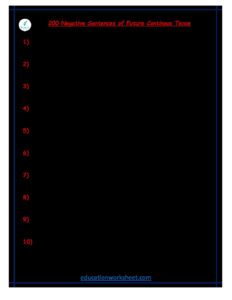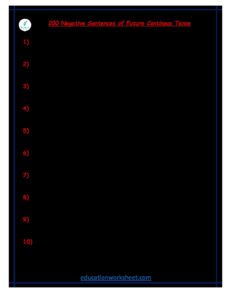Future Continuous Tense negative examples worksheets
Future Continuous Tense negative examples
Basic Structure of Future Continuous Tense
Before we delve into the negative forms of this tense, let’s first establish the basic structure of the Future Continuous Tense. To form an affirmative (positive) sentence, you use the following structure:
[Subject] + [will] + [be] + [verb (base form)] + [rest of the sentence]
For example:
- She will be studying for her exam.
- They will be playing soccer tomorrow.
- I will be cooking dinner tonight.
Now, when we want to make these sentences negative, we introduce the word “not” after the auxiliary verb “will.” The basic structure for negative sentences in the Future Continuous Tense is as follows:
[Subject] + [will not/won’t] + [be] + [verb (base form)] + [rest of the sentence]
Let’s explore various examples to understand how to create negative sentences in the Future Continuous Tense.
Examples of Negative Sentences in Future Continuous Tense

Negative with “Will Not”
-
- I will not be working late tonight.
- They will not be attending the conference next week.
- She will not be singing at the concert.
In the above examples, “will not” is used to create the negative form of the Future Continuous Tense. This implies that the actions (working late, attending the conference, and singing at the concert) will not be happening in the future.
Negative with “Won’t” (Contractions)
-
- He won’t be playing in the basketball game.
- We won’t be traveling to Europe this summer.
- They won’t be taking the bus to school tomorrow.
Using “won’t” (the contraction of “will not”) is a common way to form negative sentences in the Future Continuous Tense. It’s more informal but widely used in everyday conversation.
Negative with Different Subjects
-
- She won’t be swimming at the beach.
- You won’t be watching television all day.
- The team won’t be practicing in the rain.
- It won’t be raining tomorrow.
The subjects in the sentences above vary, and “won’t” is used to indicate that the specified actions or events won’t be occurring in the future.
Negative with Time Expressions
-
- I won’t be working during the weekend.
- They won’t be studying at midnight.
- She won’t be calling you in the morning.
Time expressions can be included in negative sentences in the Future Continuous Tense to specify when the actions won’t be taking place.
Negative with Reasons
-
- I won’t be attending the party because I have prior commitments.
- He won’t be traveling with us as he’s not feeling well.
- They won’t be playing in the park due to the bad weather.
In these examples, the reasons for the actions not happening are included. This adds context to the negative sentences.
Future Continuous Tense negative examples worksheets

Negative Questions in Future Continuous Tense
-
- Won’t you be working on the project tomorrow?
- Won’t they be coming to the event?
- Won’t he be helping you with the move?
Negative questions in the Future Continuous Tense are formed by using “won’t” or “will not” at the beginning of the sentence. These questions seek confirmation that the actions or events won’t occur.
Negative with Modals
-
- She won’t be able to attend the meeting.
- They won’t have finished the report by tomorrow.
- I won’t be allowed to enter the premises without an ID.
In some cases, modals like “be able to” and “have” are used in negative sentences in the Future Continuous Tense to express limitations, lack of completion, or restrictions.
Negative with Adverbs
-
- He won’t be working on the project very late.
- We won’t be traveling internationally anytime soon.
- They won’t be studying in the library tomorrow morning.
Adverbs can be used to modify the negative sentences, providing more information about the duration or extent to which the actions won’t be happening.
Negative with Additional Clauses
-
- She won’t be attending the conference next week, even if her schedule changes.
- They won’t be going to the concert because the tickets are too expensive.
Additional clauses can be used to explain the circumstances or conditions under which the actions won’t be taking place.
Negative with Contrasting Information
- I won’t be running the marathon this year, but I will be volunteering at the event.
- They won’t be going to the party, but they will be celebrating at home.
Contrasting information can be included in negative sentences to show that while one action won’t happen, another action will.
Negative with Hypothetical Scenarios
- If it rains, we won’t be having a picnic in the park.
- If he’s busy, he won’t be joining us for dinner.
Hypothetical scenarios can be used to create negative sentences in the Future Continuous Tense, speculating on what won’t happen based on certain conditions.
Negative with Negative Contractions
- She’ll be on vacation, so she won’t be available for work.
- They’ll be traveling, so they won’t be attending the meeting.
Negative contractions can be used for a more concise and informal tone in negative sentences, as seen in the examples above.
In all these examples, we have seen how negative sentences in the Future Continuous Tense are constructed. By using “will not” or “won’t” and the base form of the main verb, we can convey that specific actions or events will not be taking place at some point in the future. These negative sentences are essential for communicating intentions, making refusals, stating what is impossible, and describing what is not expected to occur in the future.
Future Continuous Tense negative examples worksheets

In conclusion, the Future Continuous Tense allows us to express ongoing actions or events that will happen in the future. By understanding how to form negative sentences in this tense, we can effectively communicate what won’t be happening at a particular time or under certain circumstances. Whether you use “will not” or “won’t,” these negative constructions play a crucial role in our ability to convey the absence of future actions and events.

